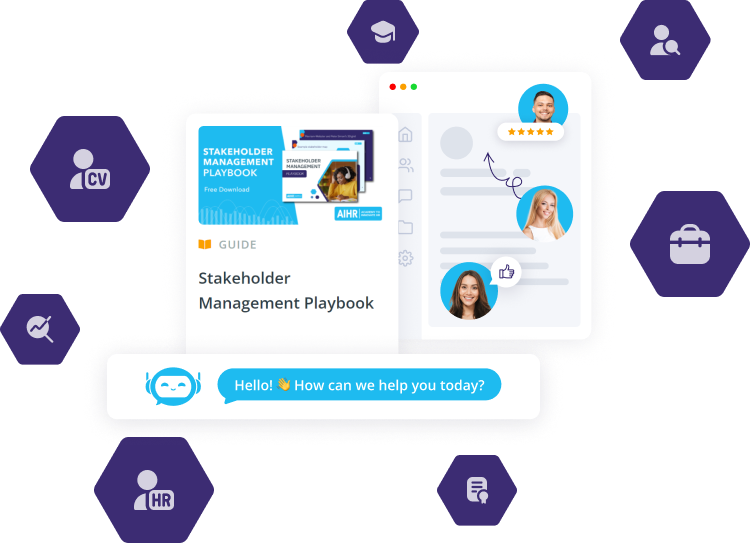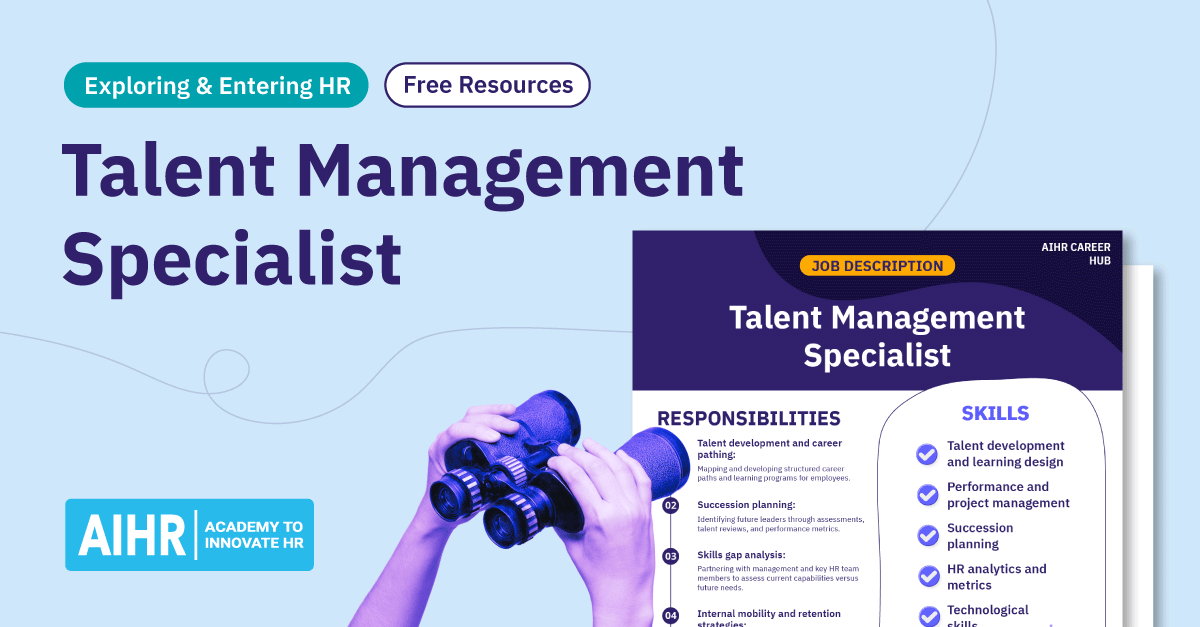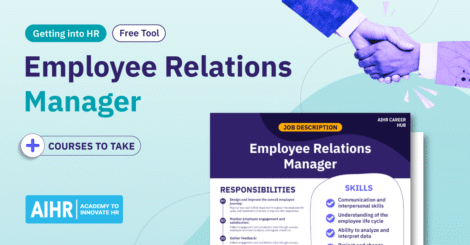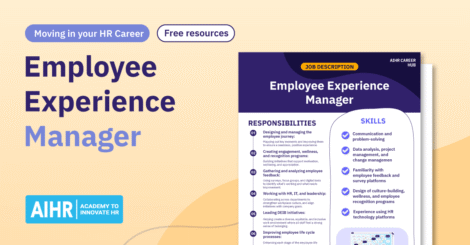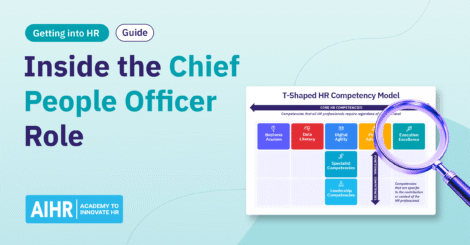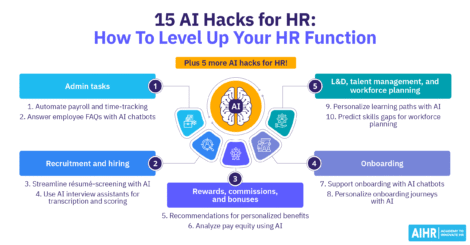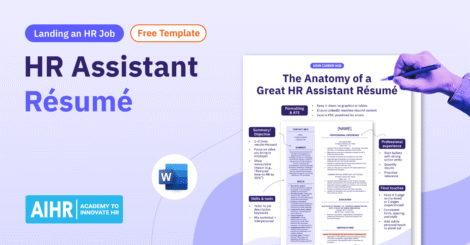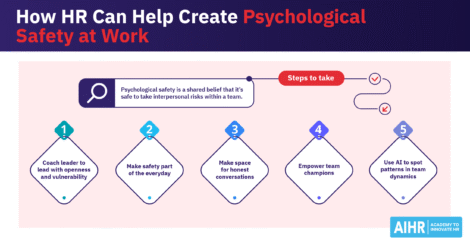If you’re particularly interested in the ‘people’ aspect of HR, seek out opportunities to become a Talent Management Specialist. As companies continue to face talent shortages, retention challenges, and digital/electronic transformations, this role has become one of the most impactful and strategic positions within the HR/People function.
In fact, companies that invest in comprehensive talent management outperform their peers by 2.2 times in total returns to shareholders. This article explains the role of a Talent Management Specialist, the skills and salary associated with this position, and which AIHR Certificate Programs can help you get there.
Contents
What is a Talent Management Specialist?
What does a Talent Management Specialist do?
Talent Management Specialist job description
Talent Management Specialist salary
What qualifications and experience do you need?
Skills and competencies for a Talent Management Specialist
Recommended AIHR Certificate Programs
Potential career path of a Talent Management Specialist
What is a Talent Management Specialist?
A Talent Management Specialist is an HR professional who focuses on growing, developing, and keeping top talent. Unlike general HR roles that handle hiring, benefits, or compliance, this role is all about people development. The aim is to unlock employee potential and strengthen company performance.
This role acts as a designer, coach, and analyst. That means creating development programs, building career paths, and using data to measure impact. At its core, the job answers one key question: Is our workforce ready for what’s next?
What does a Talent Management Specialist do?
Talent Management Specialists work across the employee life cycle, with a focus on growth and mobility. They design learning programs, run mentorships, boost engagement, and help leaders with succession planning. Their work shapes both individual careers and company culture.
Their day-to-day tasks can vary — one day might involve talent reviews with leadership, while another could include planning growth paths for high-potential staff, or digging into engagement survey data. The role requires both big-picture thinking and attention to individual development.
Talent Management Specialist job description
Let’s take a closer look at what this role typically involves. While responsibilities may vary by company, a comprehensive Talent Management Specialist job description often includes the following components:
- Talent development and career pathing: Map and develop structured career paths and learning programs that provide employees with development opportunities. This also enables them to achieve long-term growth within the company.
- Succession planning: Identify future leaders through assessments, talent reviews, and performance metrics. Work with leadership to prepare these individuals for future roles, including providing mentorship and job shadowing opportunities.
- Skills gap analysis: Partner with management and other key HR team members to assess current capabilities versus future needs, then design training plans and other initiatives to close those gaps.
- Internal mobility and retention strategies: Create policies, programs, and recognition strategies that encourage staff to explore new roles and projects internally, rather than always hiring externally.
- Employee performance and development planning: Support managers with coaching tools, performance review parameters, and goal-setting systems that help align them with departmental objectives and priorities.
- Diversity integration: Build inclusive talent development programs that support diverse pathways to leadership and advancement.
- Cross-functional collaboration: Work with Human Resource Business Partners (HRBPs), Recruiters, Learning & Development (L&D) specialists, and C-suite executives to align talent programs with company goals.
- Data and reporting: Utilize HRIS tools and analytics platforms to measure the impact of talent initiatives, such as productivity metrics, promotion rates, engagement trends, etc.
HR tip
One of the most effective yet underused tools in talent management is highlighting employee success stories. Whether it’s showcasing a career growth journey, celebrating a skills transformation, or featuring a successful mentorship match, internal storytelling builds trust and inspires others to engage.
Talent Management Specialist salary
Based on current data from Salary.com, the national average annual salary ranges from $52,940 to $83,213 annually. Entry-level pay for this position can reach $61,707 a year, while senior pay starts at around $77,553.
However, remember that salaries for Talent Management Specialists in the U.S. vary based on experience, company, industry, geographic location, and position level. In addition to salary, some companies may offer bonuses, training budgets, and stock options for strategic HR roles like this one, which reflects how essential the role has become.
Build talent management skills to drive your HR career
To optimize talent management, you must align people strategies with business goals, invest in employee development, and build a culture that helps retain top talent.
✅ Develop a strategic talent management framework to create clarity
✅ Build holistic talent profiles to support succession planning
✅ Create and sustain a culture to help your business achieve strategic objectives
✅ Master modern mobility practices to engage and retain top talent.
🎓 Future-proof your HR career with a flexible, online Talent Management & Succession Planning Certificate Program.
What qualifications and experience do you need?
Commonly required qualifications and experience for a Talent Management Specialist include:
- A Bachelor’s degree in Human Resources, Business, Organizational Psychology, or related field
- A Master’s degree or MBA is a plus (especially in Organizational Development or HR Strategy)
- Professional certifications (e.g., SHRM, HRCI, or AIHR) that can boost your profile significantly
- Two to five years in HR, L&D, Talent Acquisition, or Organizational Development
- Experience with performance management systems or HRIS tools
- Proven track record of coaching and designing or contributing to employee development programs.
HR tip
You don’t have to wait for a new title to start doing the work. Offer to lead a learning initiative, organize a mentorship program, or propose a simple skills gap analysis project, then use that experience to build your resume.
Skills and competencies for a Talent Management Specialist
Below are the key skills and competencies you’ll need to thrive in this role:
Talent development and learning design
You must be able to create engaging learning experiences that meet workforce needs, partner with subject matter experts (SMEs) to develop relevant content, and offer various training methods. Additionally, you must know how to evaluate program effectiveness using feedback and data.
Performance management and succession planning
You need these skills as a Talent Management Specialist to build frameworks for continuous feedback and facilitate and guide goal setting, development, and career planning. At the same time, you should be able to identify high-potential talent and prepare potential leaders for key roles (e.g., through mentorship programs, job shadowing, or training plans).
HR analytics and metrics
As a Talent Management Specialist, you must be able to analyze trends in turnover, engagement, promotion, and training ROI, and use dashboards to inform workforce decisions. Additionally, you must know how to review data regularly, manage talent initiatives (including timelines, stakeholders, and budgets), and use technology to streamline these processes.
Strategic thinking
Strategic thinking means understanding the business model and goals, then aligning talent strategies to support them. For instance, if your company is expanding globally, you might assess if employees are ready for international roles and design programs to close any gaps. This also means working closely with leadership to plan for future talent needs.
Analytical thinking
The role of Talent Management Specialist requires you to use analytics to identify high-potential employees, measure program ROI, and track promotion or mobility trends. Dashboards and reports show impact, but pairing data with storytelling drives action, and numbers catch attention. These elements need a clear narrative to make them stick.
Communication and influence
Strong communication is essential, and in this role, it also means influence. You’ll need to adapt your messaging to leaders, HR partners, or employees. You must use evidence to back your points and carefully navigate sensitive topics — like succession or performance. The goal is to explain complex ideas and earn buy-in from all sides.
Change management
Talent work often happens during change, such as mergers, tech upgrades, and remote shifts. Talent Management Specialists must help employees adjust, stay motivated, and grow during these transitions. This means planning for resistance, supporting managers, and rolling out changes clearly to help employees see their place in the new direction.
Collaboration and inclusiveness
A Talent Management Specialist works across different HR teams (i.e., L&D, DEIB, and recruiting), partners with business leaders, and ensures employee involvement in all aspects. As such, you’ll need to use surveys or focus groups to shape programs early, as well as listen to and include diverse voices to work toward better business and workforce outcomes.
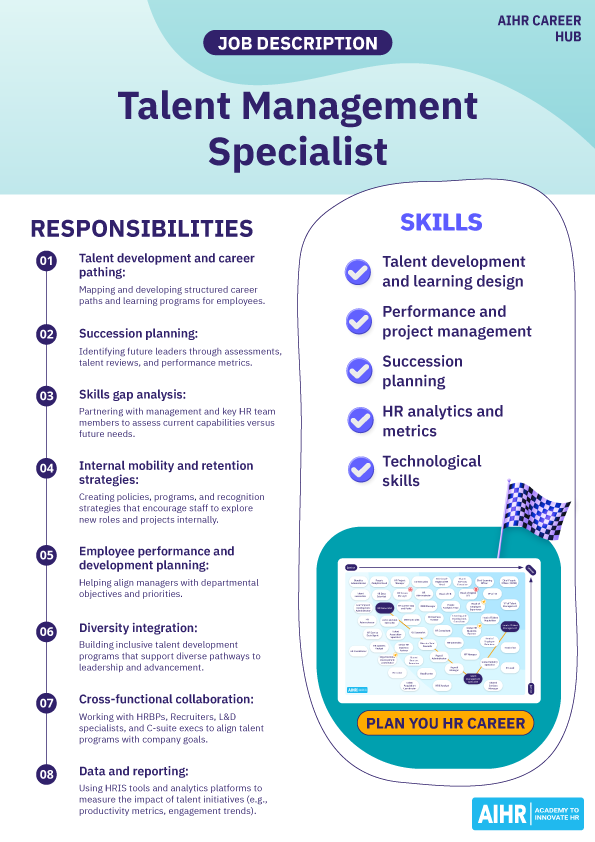
Recommended AIHR Certificate Programs
Ready to upskill? The following AIHR programs are tailored to help you succeed in talent management roles:
- Talent Management & Succession Planning Certificate Program: Enrol in this program to learn to build talent pipelines, conduct succession planning, and lead development conversations.
- People Analytics Certificate Program: This program teaches you how to use data to track performance, engagement, and the ROI of development programs, enabling you to measure impact more accurately.
- Learning & Development Certificate Program: In this program, you’ll learn the skills you need to build high-impact L&D experiences — from onboarding to leadership training.
HR tip
To make real impact, Talent Management Specialists should align closely with business unit leaders. Sit in on team meetings, ask about strategic objectives, and co-create talent strategies customized to their team’s needs. This builds credibility and ensures development efforts are truly business-driven.
Potential career path of a Talent Management Specialist
A typical career path for a Talent Management Specialist often starts in entry-level roles like HR Coordinator, L&D Assistant, or Talent Acquisition Associate. These positions help build a foundation in HR operations, employee development, and recruitment.
As you move into mid-level roles, you might become a Senior Talent Management Specialist, L&D Partner, or Performance and Succession Analyst, which focus more on strategy, coaching, and data-driven decision-making. From there, you can progress into senior or management roles such as Talent Manager or Director of Organizational Development.
At the executive level, career paths may lead to roles like VP of Talent Management or even Chief People Officer. Depending on your interests and strengths, it’s also possible to shift laterally across functions like learning, recruiting, or organizational development. Titles vary by company, but the core focus on growing and guiding talent remains consistent.
Next steps
The Talent Management Specialist role is complex but can be highly rewarding. To start your journey, reflect on your strengths and pick an area you want to develop. You can then pick a learning program (e.g., AIHR’s Talent Management or People Analytics certificate programs), and connect and network with peers in HR communities on LinkedIn or professional associations.
Talent Management Specialists play a key role in employee and organizational development, which also helps support recruiting, engagement, productivity, and retention. As a Talent Management Specialist, you won’t just help your company navigate change — you’ll shape the people who lead it.


